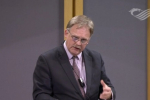
Prynhawn Da a Creoso, good afternoon and welcome to this launch event for the Cerebral Palsy Register for Wales - and thank you to the creators of the Register Jenny and Rachel for inviting me to sponsor this event – and to my co-sponsor David Melding AM.
I have been pleased to work with Jenny in her Bobath role over the last three years to help integrate Bobath Therapy into provision by Betsi Cadwalder University Health Board so that children in North Wales can directly benefit from this service.
I am very pleased to learn that twenty children in North Wales are now accessing the service.
Only last week, one parent emailed to tell me about the progress his daughter has made since starting her block of therapy there.
Cerebral palsy is the most common childhood disability in the world, affecting 1 in every 400 children in the UK.
Around 70 babies born in Wales this year will have cerebral palsy.
The damage affects the messages being received by and sent from the brain, and the way in which the brain interprets the information it receives.
As well as mobility, Cerebral palsy can also affect sensation, perception, cognition, communication, eating and drinking.
Put simply, it can make ordinary activities that most of us take for granted difficult to do.
These can include walking, talking, dressing and fine motor skills such as writing and doing up buttons.
In some children, all of these functions are affected, but other children may only have one of these difficulties.
Due to the complex nature of Cerebral Palsy, multi-disciplinary clinicians from a variety of backgrounds - including, Pediatricians, Physiotherapists, Speech and Language Therapists, Occupational Therapists, Dieticians, Neurologists, Orthopedics - and others are often required to meet the needs of people with Cerebral Palsy.
Accessing these services can be patchy, partly because we do not know where people with cerebral palsy live and what their specific different needs are.
Cerebral Palsy Registers already exist internationally, from Australia to Northern Ireland.
The Cerebral Palsy for Wales Register, will be the first national cerebral palsy register in Great Britain.
It has been designed by professionals, families and people of all ages who live with Cerebral Palsy.
It will record symptoms, assessments and ongoing care for people living with the condition, collected by health professionals and stored anonymously on NHS systems.
As in Northern Ireland, a Cerebral Palsy Register would tell us the age, size and distribution of the population of individuals who have cerebral palsy in Wales.
This would then allow services to be planned in a more efficient and effective way, and potentially bridge any gaps in provision.
Research evidence and practice confirm that early intervention and accessing the right services from an early age can prevent some of the complications caused by Cerebral Palsy and maximise people’s potential.
The register is not a quick fix to the challenges people who have cerebral palsy face.
It is a strategic answer to help make long term sustainable changes in service provision. The register will help us to:
- make a clinical difference - collecting more specific clinical data will help improve the quality of care provided to patients
- Have more understanding of the population, know where people who have cerebral palsy live and what their needs are.
- Plan the right services in the right place
- Make research into the most effective treatments possible and part of routine data collection
- and improve the quality of life of people who have cerebral palsy.
The register will act as an agent for change, it has the potential to highlight the needs of this group of individuals across many areas including, housing, leisure, education and employment.
Above all, if utilised properly a Register will increase the voice of people who have Cerebral Palsy.
Living with disability can make life a daily battle for disabled people, their carers and family – accessing the services they require needn’t be a battle too.
I am pleased to hear the Welsh Government are supportive of the development of the Register and I hope this will give extra momentum to its longer term establishment.
There is a pledge card for Assembly Members to sign up and show their support for the Register here today.
I will now pass onto Glenys Evans, who is a parent of a young adult with Cerebral Palsy and who will tell us about some of the research supporting the need for a Register.
Dioch/thank you.
